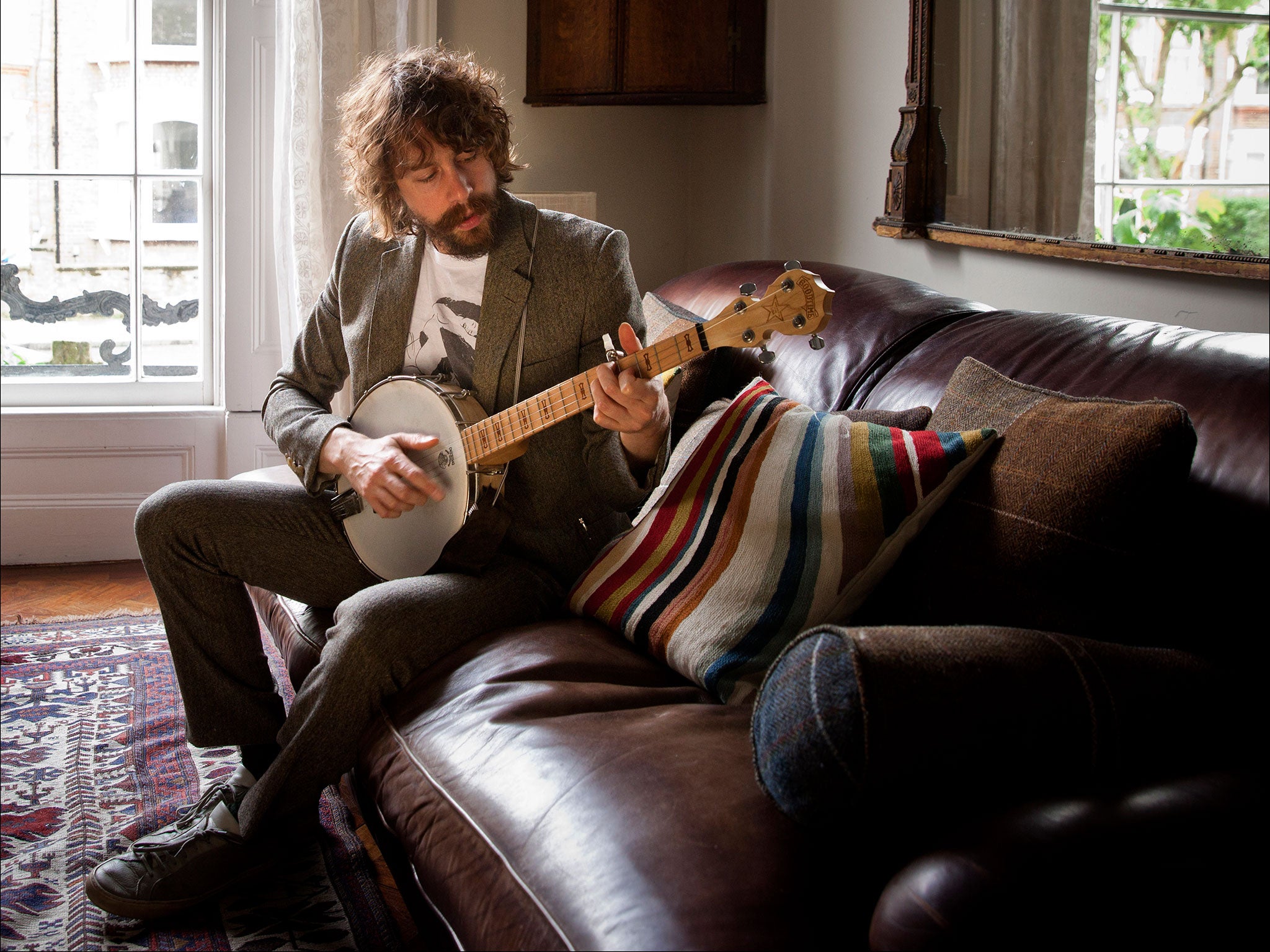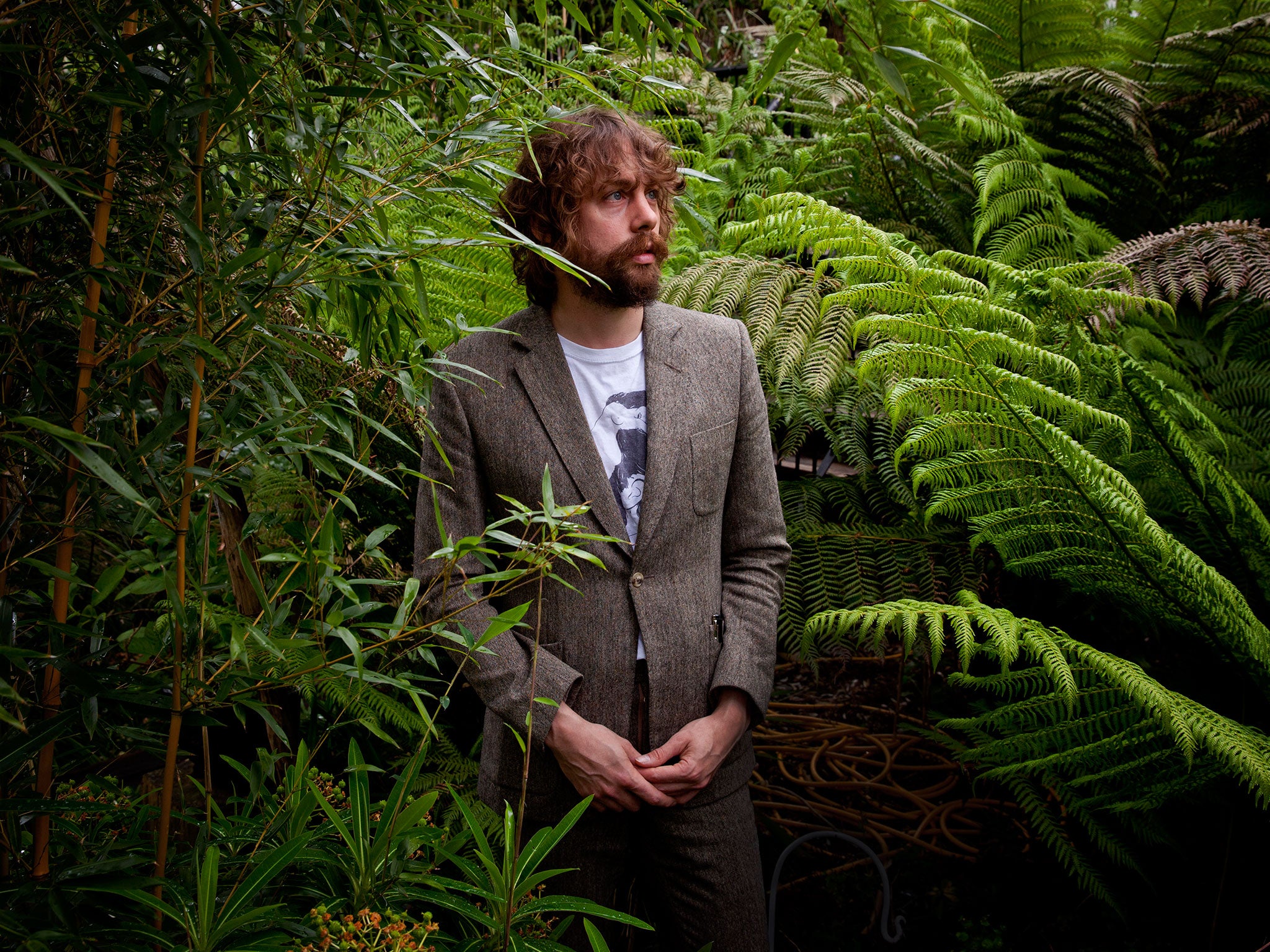Johnny Borrell interview: Razorlight's motormouth goes back to the day job
After a mixed reception for his solo album, Johnny Borrell has reformed Razorlight – minus several members – to fund his new band

From out of its case, Johnny Borrell lifts, with exaggerated care, a banjo recently gifted him by a friend, and begins to show me how to play it. I had not requested a tutorial, but a tutorial is what he offers, showing me how to make it sing, fingers curled into a half fist, the back of each nail ready to pluck at individual strings. This he does now, producing from it a gorgeously honeyed melody.
“It’s completely unlike any other instrument, right?” he says, blue eyes sparkling through his tumbledown kiss-curls. “It’s the most enjoyable thing I’ve ever played.”
He notes how under-appreciated the banjo is, and I remind him of Mumford & Sons’ efforts, the majority of whose songs revolve around it. It is not strictly possible for the individual features of a face to shape themselves into a question mark, but Borrell gives it a good go now.
“Mumford & Sons? I’ve never heard any of their songs. Do they use the banjo a lot, then?”
He’s never heard anything from one of the most successful bands of the last few years? Has he been living in a bubble?
He laughs. “Oh, I’ve always sort of existed outside culture. Thankfully.”
Despite a tiredness that has rendered the slight bags under his eyes pink and tender (he played a show in Plymouth last night, and got little sleep afterwards), the 34-year-old seems in good spirits today. It’s a Bank Holiday Monday, the rain reliably pouring. We’re comfortable in the living room of his manager’s North London house, Borrell looking every inch the bohemian in an old Sigmund Freud What’s on a Man’s Mind T-shirt, vintage suit, tennis shoes. Complementing his shaggy mop is a wispy beard that suddenly grows lustrous around the moustache, whiskers the colour of tobacco.
His good spirits come as a relief, frankly, because Borrell, always a brilliant interview, has long since stopped enjoying offering the bon mots he so readily proffered during his Razorlight heyday.
He’s been burned too often by them, he says, too often misunderstood and pilloried, the British media now convinced that because he sells a fraction of the records he once did – his 2013 debut solo album Borrell 1 sold 594 copies in its first week of release, and failed to dent the Top 100 - he is now a spent force, tail humble between his legs. His argument is that, for someone who resides outside of culture, sales have nothing to do with anything.

Nevertheless, his trajectory has been a compelling one. Ten years ago, he was the largely self-appointed great white hope of British rock, the new Bono (“but better looking,” argued New Woman magazine), all cheekbones and snake hips, and so wonderfully sure of himself. “If Dylan’s making the chips,” he once said, “I’m drinking champagne.” He dated a movie star (Kirsten Dunst), and pouted from the cover of Vogue magazine, half naked. When Dunst consciously uncoupled from him, it was by all accounts because he had ridden his motorcycle through her house, trailing oil, petrol stink and arrogance in his wake.
“Couldn’t understand the fuss,” he says now, shrugging. Razorlight, meanwhile, couldn’t cope with their spiralling success, Borrell reportedly becoming increasingly diva-ish. They split amid bitter acrimony.
Enjoy unlimited access to 100 million ad-free songs and podcasts with Amazon Music
Sign up now for a 30-day free trial. Terms apply.
ADVERTISEMENT. If you sign up to this service we will earn commission. This revenue helps to fund journalism across The Independent.
Enjoy unlimited access to 100 million ad-free songs and podcasts with Amazon Music
Sign up now for a 30-day free trial. Terms apply.
ADVERTISEMENT. If you sign up to this service we will earn commission. This revenue helps to fund journalism across The Independent.
“I’d entered into that celebrity world to an extent voluntarily,” he says, “but it never appealed. Yes, I’d made the shiny pop records, but I knew that my creativity had to go somewhere else next.” Where it ultimately went was onto Borrell 1, which, poor sales notwithstanding, was fun and joyful, and certainly never dull, improbable saxophone solos all over the place. Lots of great albums, he suggests, get overlooked at the time. Hindsight may yet prove kind to his.
“I don’t think [Scott Walker’s 1969 cult classic] Scott 4 is a bad record, you know? The Velvet Underground and Nico wasn’t a bad record, and I would hardly suggest, say, The Magic Flute by Mozart was at all ropey, would you?” He hasn’t quite abandoned the bon mots just yet, then.
“See, music is its own language,” he continues, “and we are lucky, as musicians, to speak a language that exists in its own right. By playing music, you are tapping into something that is intrinsically human. Rhythm was around before language, after all.” He sighs, as if exasperated by his own monologue.
“What I’m trying to say is, there is music and there is the music business. For me, there is no connection between the two."

Next month, Borrell will resuscitate Razorlight for series of summer shows. He has agreed to do this, albeit without original members Andy Burrows, Carl Dalemo and Bjorn Agren (wounds remain raw), for two reasons: firstly to celebrate the 10th anniversary of the band’s debut album Up All Night, and also because it will help to fund the record label he has set up to release records for his new outfit Zazou, a 10-piece ensemble he says is prone to “total creative freedom”, ie, jazzy interludes.
He is wildly enthusiastic about Zazou, which, he insists, is everything to do with music and nothing to do with the pursuit of fame.
“Up until about 2006, I just wanted to look behind every door that had previously been closed to me. Fame is a drug that combines really well with a lot of other bad drugs, but I’m allergic to cocaine. Don’t get me wrong. I had some amazing times, but at the peak of it all, my reaction to celebrity was to go off and live on a remote Scottish island for four months.”
He now divides his time between London, Paris and a village in France’s Basque region. Nobody there knows him as a former preening rock star, and this comes clearly as a relief. He’s happy these days, he says, at peace. I ask if he is in a relationship. He chuckles. “Yes, yep, maybe, early stages, hope so.” He picks up the banjo now, and leads me, Pied Piper style, into the garden, plucking as he goes.
“I feel like I’m just warming up, you know?” he says. “My musical potential is increasing and increasing. It doesn’t feel like the end of anything. It feels like the beginning.”
He grins through his whiskers. The rain still falls, which is not good for the banjo. We head back inside.
Johnny Borrell and Zazou play London’s Jazz Cafe on 31 May. Razorlight tour the UK throughout the summer
Join our commenting forum
Join thought-provoking conversations, follow other Independent readers and see their replies
Comments